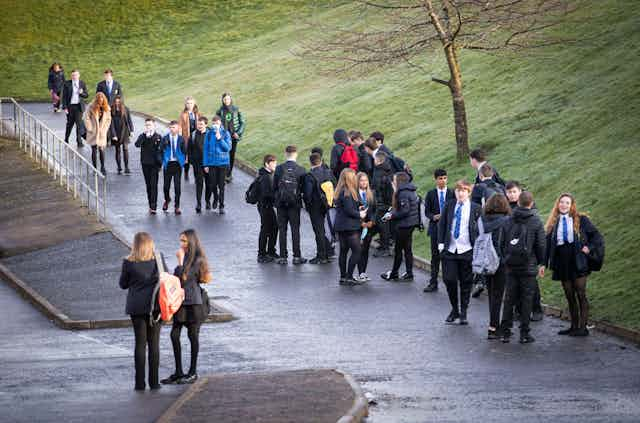The transition to secondary school is a major life event for 11-year-old children in the UK. With a larger school environment comes greater social challenges. New pupils have to make new friends as well as build new relationships with lots of different teachers. The change brings academic challenges too: testing becomes more common and more important and children are taught a greater array of subjects.
For some children, this is a pretty straightforward process. They easily meet people and settle into new routines and different styles of teaching. For others, though, it can prove very stressful. Leaving primary school can have a negative impact on their emotional well-being. And where they lack support from adults or do not have good coping skills, these effects can be long-lasting.
Psychologists suggest that our ability to cope with challenges declines as the number of stressors in our life increases. Indeed, research shows that transitioning from primary to secondary school can be more difficult if children are also experiencing other changes at the same time.
So how has COVID-19 impacted children’s experience as they move from year six to year seven? And what can parents do to help?

COVID stress
Over the past four years, the UK government has placed an increased emphasis on supporting children’s emotional well-being within schools. However, pandemic school closures have meant that the transition support offered in primary schools in previous years, such as school visits and classroom work, could not be put in place.
This year, like last year, children moving from primary to secondary school face additional uncertainties and stresses associated with the pandemic, from handwashing and social distancing, to concern about their own and their loved ones’ health and well-being. They have had to deal with changes to their school environments including remote learning and the bubbles in which school life continues to be organised.
They will also have missed out on opportunities they would usually have had to mark the end of their primary school experience: sitting national assessments, saying proper goodbyes to classmates and teachers, school trips and leaving ceremonies. This is likely to have affected how they adjusted to secondary school.
What can parents do
We recently conducted a UK-wide survey to explore parents’, children’s and teachers’ experiences of primary to secondary school transition during the pandemic. Our findings show the importance of prioritising children’s emotional well-being, which is something that parents can do at home.
Celebrating children’s time at primary school is a way of encouraging them to see school transition as an opportunity for growth and progression rather than a loss. Our research shows that the end of primary school can be more upsetting when children are focused on what they are leaving behind. One year seven child we spoke to in a focus group said that school transition is more often presented as the end of primary school and not as a new beginning at a new school.
Parents can help children talk about how they feel and provide reassurance that being sad and anxious about leaving primary school is normal. They can also help children to focus on the new and exciting opportunities secondary school will bring. Education specialists talk about the benefits of doing this in a gradual, child-led manner.
Children need to know what secondary school will be like and parents should try to tell them without passing on their own anxieties. As one year seven child told us:
If they make too much of a fuss about it, then it does proper worry you. It’s like a soldier preparing for war, like if they give them a whole entire suit of armour it’s then they can think, ‘What are we going against?’.

Our research has shown that giving children space to explore their feelings and develop coping skills can help them see transition as an exciting opportunity. The lesson plans we have developed, Talking about School Transition, encourage children to think about how their thoughts, feelings and behaviours are interlinked. Through structured activities and class-based discussions children are led to identify negative thoughts (“I won’t make any friends”) and to try and change them into more positive thoughts (“I had good friends at primary school and will make good friends at secondary school too”).
As COVID-19 continues to transform the society we live in, more research is needed on how to support children. Additionally, transition support for children and parents should start much earlier than year six and be integrated throughout their time at primary school.

